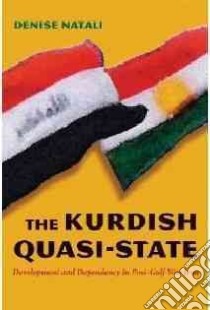The Kurdish Quasi-state - 9780815632177
Un libro in lingua di Denise Natali edito da Syracuse Univ Pr, 2010
- € 23.40
- Il prezzo è variabile in funzione del cambio della valuta d’origine
"The Kurdistan Regional Government (KRG) is not just one of the most important developments in the Middle East, but is also an important experiment in state building. Natali, who has been able to observe the evolution of the KRG from its inception, provides a sophisticated analytical approach to its institutionalization, shortcomings, and successes. Changing international boundaries will make this book a must for scholars working on similar cases."---Henri J. Barkey, editor of Reluctant Neighbor: Turkey's Role in the Middle East
"Dr. Natali offers an insightful, empathetic, and comprehensive analysis of political, social, and economic change that has occurred in the Kurdish Regional Government (KRG) since 1991, but especially after 2003. Drawing upon a wide variety of source materials, including extensive interviews in the KRG, Natali presents the most comprehensive analysis to date of the political and economic change that has transformed the Kurds from a marginal to a central player in post-2003 Iraqi politics."---Eric Davis, author of Memories of State: Politics History, and Collective Identity in Modern Iraq
Despite ongoing instability and underdevelopment in post -Saddam Iraq, some parts of the country have realized relative security and growth. The Kurdish north, once an isolated outpost for the Iraqi army and local militia, has become an internationally recognized autonomous region. In The Kurdish Quasi-State, Natali explains the Nature of this transformation and how it has influenced the relationship between the Kurdistan region and Iraq's centeral government.
This much-needed scholarship focuses on foreign aid as helping to create and sustain the Kurdish quasi-state. It argues that the generous nature of external assistance to the Kurdishtan region over time has given it new forms of legitimacy and leverage in the country. Since 2003, the kurdistan region has gained representation in the central government and developed commerical investment and political ties with regional states and foreign governments.
Drawing on extensive field research, Natali explores how this transition has had positive and unintended consequences on Kurdish-state relations. Greater complexity in the rgional political economy has demanded new forms of compromise with the central government. The Kurdistan region may have become a distinct political entity that challenges Baghdad; however, the benefits of aid and the logic of quasi-statehood ensure that it will remain part of Iraq.
Acutely familiar with the nuances of Kurdish politics, society, and culture, Natali has produced a timely and immensely important book for policy makers, scholars, and practitioners interested in the region.
Informazioni bibliografiche
- Titolo del Libro in lingua: The Kurdish Quasi-state
- Sottotitolo: Development and Dependency in Post-gulf War Iraq
- Lingua: English
- Autore: Denise Natali
- Editore: Syracuse Univ Pr
- Collana: Syracuse Univ Pr (Hardcover)
- Data di Pubblicazione: 30 Giugno '10
- Genere: SOCIAL SCIENCE
- Pagine: 158
- ISBN-10: 0815632177
- EAN-13: 9780815632177


